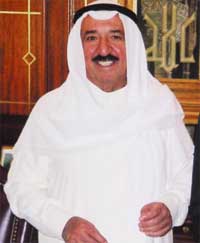 Kuwait's Emir Sheikh Sabah Al Ahmad Al Sabah on Thursday issued a decree approving a 16-member new Cabinet that includes three Islamists and saw the exit of two leading liberal ministers. Six ministers in the new government are members of the ruling Al Sabah family including Prime Minister Sheikh Nasser Mohammed Al Ahmad Al Sabah. The family continues to hold the key porfolios of interior, defence, foreign affairs and energy. Like the previous lineup, the new Cabinet includes only one woman minister, Maasouma Al Mubarak, who retained the planning ministry.
Kuwait's Emir Sheikh Sabah Al Ahmad Al Sabah on Thursday issued a decree approving a 16-member new Cabinet that includes three Islamists and saw the exit of two leading liberal ministers. Six ministers in the new government are members of the ruling Al Sabah family including Prime Minister Sheikh Nasser Mohammed Al Ahmad Al Sabah. The family continues to hold the key porfolios of interior, defence, foreign affairs and energy. Like the previous lineup, the new Cabinet includes only one woman minister, Maasouma Al Mubarak, who retained the planning ministry. The naming of Kuwait's 22nd Cabinet since independence in 1961 came just two days after the emir asked his nephew Sheikh Nasser to form a new government. He also appointed his half-brother, former interior minister Sheikh Nawaf Al Ahmad Al Sabah as crown prince, thus maintaining the two posts separate since they were first split in 2003, a step that was welcomed by most Kuwaitis.
Sheikh Jaber Al Mubarak Al Sabah, the deputy premier and defence minister in the outgoing Cabinet, was promoted to first deputy prime minister and also handed the key defence and interior ministries. Foreign Minister Mohammad Al Sabah retained his post and promoted to deputy premier. Sheikh Ahmad Fahd Al Sabah, another nephew of the emir, retained the portfolio of energy, combining the ministries of oil and electricity.
Sheikh Nasser, 65, replaced 76-year-old Sheikh Sabah, who had been prime minister since 2003 after becoming emir following the ouster by parliament of former ailing ruler Sheikh Saad Al Abdullah Al Sabah. The unprecedented ouster followed a crisis over succession after the death on January 15 of Emir Jaber Al Ahmad Al Sabah.
Besides the prime minister, the new Cabinet has five new faces, including Yussef Al Zalzalah, an Islamist Shiite MP and former university professor, appointed commerce and industry minister, replacing liberal Abdullah Al Tawil. A member of the Islamic Constitutional Movement, or Muslim Brotherhood, former MP Ismail Al Shatti, was appointed minister of communications.
Moderate constitutional expert and academic Adel Al Tabtabai was named education minister in place of Rasheed Al Hamad and Sheikh Ali Al Jarrah Al Sabah was appointed minister of social affairs and labour, replacing Faisal Al Hajji, a leading liberal figure.
Abdullah Al Muhailbi, chairman of the municipal council and a prominent tribal figure, was named minister of municipality and environment, a new post in the Cabinet. Abdullah Al Muatuq, an Islamist, retained the Awqaf and Islamic affairs portfolio in addition to the justice post. Former justice minister Ahmad Baqer, an MP from the hardline Salafi movement, was not retained.
For only the second time in Kuwait's history, the new Cabinet has two Shiite Muslim ministers instead of the usual one. They are Zalzalah and Mubarak. The first time was in 1992.

 The Kuwaiti ruling family remained at odds Thursday over succession issues following the emir's death, leaving the oil-rich Gulf state in a political impasse. Top members of the Al-Sabah family held lengthy meetings Tuesday and Wednesday on issues such as the appointment of a new crown prince and a prime minister, but failed to reach decisions, sources close to the family told AFP.
The Kuwaiti ruling family remained at odds Thursday over succession issues following the emir's death, leaving the oil-rich Gulf state in a political impasse. Top members of the Al-Sabah family held lengthy meetings Tuesday and Wednesday on issues such as the appointment of a new crown prince and a prime minister, but failed to reach decisions, sources close to the family told AFP.  Prime Minister
Prime Minister  KUWAIT CITY â A crisis in the ruling family of Kuwait, which has a tenth of world oil reserves, is likely to usher in a new heir to the ailing Amir whose existing crown prince is also ill, diplomats and analysts said yesterday.
KUWAIT CITY â A crisis in the ruling family of Kuwait, which has a tenth of world oil reserves, is likely to usher in a new heir to the ailing Amir whose existing crown prince is also ill, diplomats and analysts said yesterday. Kuwait named a new information minister on Wednesday, two months after his predecessor quit as he was about to be questioned in parliament over allowing "immoral" Western-style concerts in the country. The Emir, His Highness Shaikh
Kuwait named a new information minister on Wednesday, two months after his predecessor quit as he was about to be questioned in parliament over allowing "immoral" Western-style concerts in the country. The Emir, His Highness Shaikh